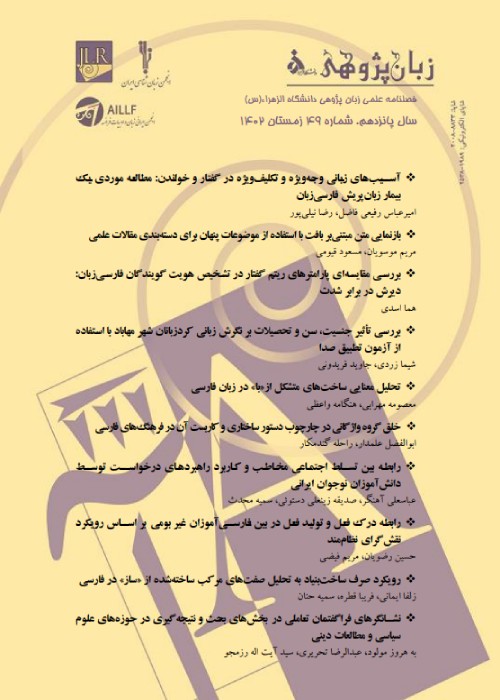A Critical discourse Analysis of Power Relations in Two Persian Constitutional Laws in the Course of Twentieth Century
Language with a socially oriented nature is the realization of values, social behaviors and the ideologies as the unsaid and implicit proposition located in linguistic structures and function. Critical discourse analysis, like other hermeneutic methodologies, seeks to describe, interpret, and explain language across texts and socially oriented contexts. The present study is an attempt to investigate power differences and inequalities arising from discourse conventions, situational context and events in two different constitutional laws. These discursive conventions are ideologically-structured together within the orders of the texts and discourse of constitutions to naturalize the power relations. The emphasis in this study is upon the discursive structures not as a product rather as a dynamic process based on developing a triangulated theoretical framework of interrelated concepts and categories projecting power relations and facilitating the linguistic manifestations between discourse and other social and forensic elements through sociocultural changes at societal (national), regional, institutional and organizational levels in the early and middle twentieth century. To do the aims of this research and to find answers for the research questions both qualitative and quantitative approaches served the needs in this study. The qualitative data analysis of this study was based on critical discourse analysis inspired by Fairclough (2015), Hymes’s (1974) pragmatic approach, and the quantitative data analysis was based on 20 out of 50 social constituents of Van Leeuwen (2008) which was calculated through Chi square. The findings of this study manifested how lexical and textual choices have intensified and made some of the power relations more visible across the language from the section of people’s rights in both constitutions, Islamic Republic of Iran (1979) and Persian constitution (1906), to contrast and analyze the discursive and non-discursive structures of two aforementioned texts as well as to interpret and determine the discursive features, the social conditions of the century. Besides, the forensic contexts of these two texts should be related to three different strata of the texts: the linguistic environment in which the discourse occurs; the level of social institution which constitutes a wider interpretation and explanation for the discourse; and the level of forensic context as a whole. The social and forensic conditions which lighten the ideology, power relations and inequalities shape the linguistic production on the surface. Also, the pivots of gathering data were allocated to the social features proposed by Van Leeuwen (2008) such as the inclusion and the exclusion constituents as an evaluation method to contrast the lexical choices for language and power manifestations in texts such as “all and every versus none”, “dishonor versus offensive”, and “law versus Islamic law (religious law)”. The social interaction of these features was manifested through the linguistic choices in the constitutions. The subcategories of inclusion and exclusion are as follows: Inclusion: Nomination Objectivation Impersonalization Differentiation Personalization Identification Indifferentiation Specification Determination Appraisement Dissociation Assimilation Association Individualization Categorization Collectivation Exclusion Backgrounding Suppression The quantitative data were analyzed (applying SPSS software) through calculating Chi square (the non-parametric statistics) to compare the observed and expected frequencies of utilizing lexical choices in both texts.According to the research analysis, the theoretical framework focused and put forward a multiple method that represented the relations between language, power and context as three interrelated systems, in which there is an ongoing dynamic interaction. Consequently, this research proposed and applied an eclectic selection of discursive tools, a pragmatic context-based approach and socially oriented criticism as the most appropriate method to analyze forensic contexts of the constitution for Islamic Republic of Iran (1979) and Persian constitution (1906). This method as the eclectic includes discourse analysis, critical approach and forensic linguistics which intersect with each other and partly overlap, using different options, yet functioning as one structured whole, the members of which are interdependent. Based on the contrastive analysis of this research, the two texts draw on different interpretation in approaching the forensic context to distinguish the ideology and power relations in deeper strata. According to the findings, ideological formulations of power along with unequal relations dictated lexical choices in forensic text and manifested that discourse practices and orders of discourse represent ideological-discursive formulations along with power across linguistic disciplines. The power relations have special significance in the execution of laws and ordinances of Islam and in achieving just relations in society. The power also plays a vital role toward the ultimate goal of the critically discursive structures.
- حق عضویت دریافتی صرف حمایت از نشریات عضو و نگهداری، تکمیل و توسعه مگیران میشود.
- پرداخت حق اشتراک و دانلود مقالات اجازه بازنشر آن در سایر رسانههای چاپی و دیجیتال را به کاربر نمیدهد.


